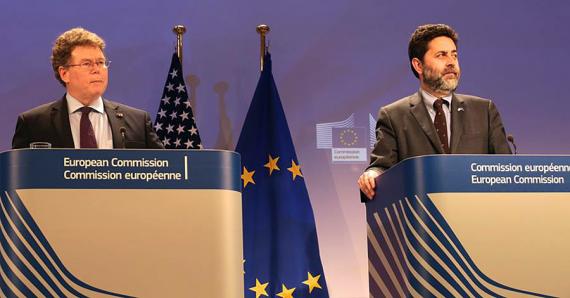HEFN Communications Associate Lauren Linville authored this post.
Some recent headlines concerning environmental health and chemicals policy have caught our attention at HEFN. Here’s the scoop on House Republican moves on Toxic Substances Control Act (TSCA) reform, health risks from chemicals in feminine hygiene products, new moves under California’s Safer Consumer Products regulations, and U.S.-EU trade negotiations with implications for chemicals policy and shale gas exports.
House Republicans introduce new TSCA reform bill; advocates respond
In late February, Rep. Shimkus (R-IL) introduced a draft bill to update the 1976 law that regulates chemicals in commerce (known as TSCA). The House Energy and Commerce Committee is using this draft “Chemicals in Commerce Act” to debate chemicals policy reforms. At a hearing held earlier this month, advocates argued that the proposed legislation would not provide the safeguards needed to protect public health and the environment. The House bill follows nearly a year of stalled action in the Senate on a different draft TSCA reform bill, the Chemical Safety Improvement Act (CSIA).
Andy Igrejas, Director of the Safer Chemicals, Healthy Families National Campaign, will discuss the Shimkus draft and advocates’ responses on a HEFN funder-only call on Thursday, March 27.
Raising concern and questions about toxic exposure from feminine products
A recent Environmental Health Perspectives article sheds light on scientific findings (or lack thereof) about how chemicals in feminine products may impact women’s and girls’ health. The comprehensive and accessible article provides an overview of research on vaginal exposures, risks of health impacts from toxics in these products, and the agency responsible for regulation. The article flags needs for more research to address critical gaps in understanding, paralleling advocates’ calls to “Detox the Box” and get toxics out of feminine care products.
California takes next step in its Safer Consumer Products Program
After passing new regulations in October 2013 to strengthen regulation of hazards in consumer products, this month the California Department of Toxic Substances Control has identified the first three product-chemical combinations which the state will prioritize for action. The chemicals found to have adverse impacts on people, wildlife and/or the environment that are being prioritized for regulation or substitution include specific substances being used in:
- Paint and varnish strippers and surface cleaners;
- Spray polyurethane foam systems such as in insulation for homes and buildings, weatherization, sealing, and roofing; and
- Children’s foam-padded sleeping products including nap mats, play pens, and portable crib mattresses.
While prioritized for government examination, regulations will not be final until adopted via California’s rulemaking law. Follow this process, expected to begin within 12 months, via the DTSC’s Safer Consumer Products site.
Transatlantic trade negotiations proceed with implications for U.S. chemicals policy and shale gas exports
Early this month a U.S. delegation of over 100 experts participated in the fourth round of negotiations of the Transatlantic Trade and Investment Partnership (TTIP) between the European Union and United States. TTIP would be a new trade agreement between the U.S. and EU the two parties say could remove barriers that slow or block trade efficiency by harmonizing regulations.
Environmental health advocates in the U.S. and EU express concern that TTIP could enforce a lowest-common denominator turning public interest protections into trade barriers, allowing industry to sue governments over environmental and health regulations that have adverse economic impacts on business. The trade agreement could affect the standing of state regulations such as the California consumer products legislation outlined earlier, as well as of REACH, the EU’s law regulating the manufacture and use of chemicals.
Recent TIPP negotiations also highlighted significant implications for U.S. shale gas development, as EU business interests eye a lowering of trade barriers to the U.S. export of shale gas boom for European energy supply chains. Evolving geopolitical realities are also underscoring EU interest in U.S. natural gas. One EU expert observed, “It obviously has great political pertinence right now, when we see Russia, the sole energy supplier of some countries in Europe, asserting itself on Europe’s borders.” Some U.S. officials are also hoping to translate the domestic natural gas boom into global influence.
NGOs and funders on both sides of the Atlantic are calling for more official transparency and public scrutiny of the negotiations, such as in Shorey Myers’ September 2013 blog post.

